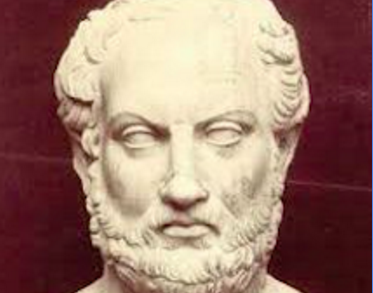Thucydides – Ancient Athenian General and Historian
Comments Off on Thucydides – Ancient Athenian General and Historian
 Much of our modern knowledge concerning life in the ancient world is the product of diligent scholars. These luminaries recorded what they observed in their lifetimes and shaped history, philosophy and other arts with their opinions and actions. Thucydides, an Athenian historian and one-time general, is notable for not only preserving history but taking a direct role in its shaping. Here’s an overview of who he was and what he accomplished:
Much of our modern knowledge concerning life in the ancient world is the product of diligent scholars. These luminaries recorded what they observed in their lifetimes and shaped history, philosophy and other arts with their opinions and actions. Thucydides, an Athenian historian and one-time general, is notable for not only preserving history but taking a direct role in its shaping. Here’s an overview of who he was and what he accomplished:
Who Was Thucydides?
In his writing, Thucydides refers to himself as an Athenian from the coastal subdivision of Halimous. According to his own accounts in his famous “History of the Peloponnesian War,” he owned gold mines in Thrace. He also said that his relationships with his neighbors in Thrace led to him receiving a military assignment as a general there around 424 B.C.
It was around this time that a Spartan general attacked the city of Amphipolis onthe Thracian coast. The local Athenian commander sent messengers requesting that Thucydides come to his aid. The encroaching Spartans, however, were aware of Thucydides’ nearby presence and reputation.
To avoid a tough battle, the Spartans offered Amphipolis favorable terms so that its populace would surrender faster, and by the time Thucydides got there, they had already captured the city. When news of his failure reached Athens, he was punished by being banished from his country.
Period of Exile
While Thucydides may have initially been upset about his banishment, he didn’t waste what would eventually become a two-decade exile. It was during this time that he journeyed throughout the Peloponnesian League of city-states led by Sparta. He also wrote his “History of the Peloponnesian War,” believing that this conflict was one of the most significant events in Greek history.
Supported by income from his mining activities, Thucydides was able to explore widely and personally research many of the details that contributed to the war. Unfortunately, it’s believed that he perished before he was able to complete the book. The text halts rather abruptly in 411 B.C., which was about seven years ahead of the conflict’s conclusion.
An Enduring Legacy
Like many historians of his era, Thucydides wasn’t above the use of illustrative narrative and artistic liberties. While some scholars view his “History” as being fairly objective and detached, it’s clear that the text contains a healthy dose of his own unique perspectives. It also represented a major turning point in how Western civilization recorded history.
Thucydides’ writing style earned him the title of “father of scientific history.” Compared to many of his contemporaries, he was extremely rigorous when it came to gathering evidence. Notably, he also refrained from ascribing events to mythological forces or godly influences, instead preferring to research cause and effect. He had a keen interest in determining the role of human nature, religion and customs in crises like wars and pandemics.
One section of Thucydides writing, the “Melian Dialogue,” set the groundwork for the modern philosophy of political realism. Political realism holds that individual behaviors, international events and political actions are all motivated by fear and self-interest. The “Melian Dialogue” continues to serve as an exemplary source of study for political scientists, military leaders and diplomats who follow this theory.
Sources:
Wikipedia – History of the Peloponnesian War
Categorized in: Ancient Greek History
This post was written by Greek Boston





